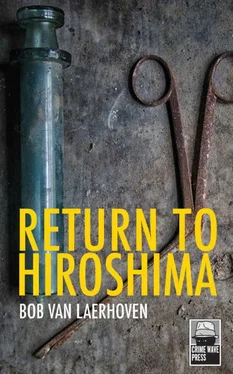Hiroshima – the Suicide Club squat – Kabe-cho – Mitsuko – March 14 th1995
The cellar has vaulted corners. The bare light bulb dangling from the ceiling casts shadows everywhere. In the far left corner a couple of old-fashioned metal filing cabinets create a separate space with an opening to the left. I slip through it and stop abruptly as if I’m facing a wall. A hideous creature is staring at me, only feet away. It’s grey, with horns, a flat pig-like nose, yellow eyes with black pupils, a frozen grin and sabre tooth tiger tusks. A crop of stiff hair has been planted between the horns like a horse’s mane. Déjà vu , I think to myself, and a familiar sense of panic creeps up on me. The feeling remains, gnawing at the edge of my consciousness, even after I realise it’s a Noh mask. There’s a desktop computer on top of a table. I open a drawer in one of the filing cabinets. It’s full of manga comics exploding with sexual sadism, sweat drenched female bodies being taken in every imaginable position by demonic creatures with grotesquely engorged genitals. One manga is situated in feudal times and depicts an adulterous woman undergoing bukkake : all the men in the village older than fifteen gather around her trussed, gagged and naked body. The men masturbate in her face and fill her nostrils with their seed until she chokes. I see her eyes bulging in a circle of exaggeratedly swollen penises. I know bukkake was invented by the Japanese porn industry in the 1980s and isn’t a classical sexual practice, but the manga artist has a skilled imagination. On Hashima I was fascinated for a while by the works of Freud and his rigid sexual theories. They transported me into a dream-like state in which I designed my own world. I was only sixteen at the time, but in hindsight my daydreams were perverse, and I still don’t know why I didn’t realize it at that time. Bodies were objects to be used and abused and they had a use-by date. Emotions were enlarged and inflated, a caricature of reality. Rage and cruelty monopolized the conversation. Sex went hand in hand with humiliation and often with death. Bodies beaten and bent double were tossed from the cliff into the sea. I saw details, colours, heard sounds, was overwhelmed by the maelstrom of this alternative world. Later the visions stopped. I don’t remember when or why, but I can sense them creeping up on me again in this dark cellar, whispering in my ear that I’m a deviant , a freak of nature. I close the drawer with the same feeling that I’ve seen all this before. The other cabinet contains folders with photos of a man I recognise to my surprise as a member of my father’s Yuzonsha. He has strong Mongolian features, his eyes almost invisible. He’s wearing what looks like a curtain of long black hair and appears to be the spiritual leader of some sect or other. Apparently, he’s called the Blessed One and he presents himself as humanity’s new redeemer and the saviour of Japan. Baroque statements vie with each other in their use of elevated words like “light”, “unity”, “the Almighty Creator”. His complicated and highly symbolic creation narrative seems more intended for children than adults. I’m about to return the folders when I’m distracted by one of the titles: Mu: the beginning of humanity .
At that moment they all flood back, the endless rambling monologues my father delivered from his eagle’s nest while the wind tugged at his hakama . His never-ending stories about the age-old continent of Mu of which Japan was a part, and the magnificent inhabitants of the mythical land, superior in every way to modern men and women. His accounts fascinated me. Why do I find it so hard to remember them now? Why do I have the feeling I’m in shock? That I’ve lost touch with myself? Is this mental state only a result of recent events? Ever since I started to bleed from my vagina and realised that the blood was mixed with lumps of tissue I’ve been unable to shake the idea that there’s something seriously wrong with me. Did Dr Kanehari lie to me? I was at his clinic only a few days ago, but I can barely remember his face. His words sound distorted in my mind, as if they’re being spoken under water: phantom pregnancy. My heart begins to race and I feel dizzy. I try to concentrate on the text in the folder in the hope it will focus my memory. In a very roundabout manner it states in essence that Japan is the oldest country in the world and that in the olden days there was an umbilical cord connecting heaven and earth that brought forth the god Kunitokotachi-no-Mikoto . The Japanese are direct descendants of the children sired by this divinity, but they are unaware of it. A shiver runs down my spine as I read these words. The feeling that something is being whispered in my ear is so intense it makes me turn and look behind me. No one. I read on. Once again it claims in bombastic language that “the yellow race of Mu”, the people of ancient Japan, was superior to every other yellow people, and all of them superior to the white, black or brown races. The people of Mu understood the language of the divine signs, the kamiyomoji, which served as a source for all future alphabets and ideograms. It reminds me of my father’s dogged determination to develop software that would enable his computers to communicate with kanji. It scares me to think that Reizo’s cellar, a young man I consider to be mentally disturbed, contains ideas and images similar to those of my father. In another drawer I find some Oni masks with horns and fangs, most of them red, a couple black, with tresses of coarsely braided string.
I start up the computer but it asks for a password. I decide to shut it down again, but type something on the off chance, not sure why: baita – whore, a word Reizo uses a lot when he’s talking to Yori. I have access to the files. I’m not even surprised. Everything in my head is floating, weightless, as if I’ve been taking drugs. The text I open looks like a chapter from the novel Reizo’s always going on about. Ostensibly it takes place in the future in the middle of a “brutal conflict” between the youth and the Japanese government. The government is determined to round up all the troublemakers and isolate them on an island without provisions. There’s water on the island in the form of a couple of lakes, but there’s no food. Knives and axes: all they have. Tiny airborne cameras flutter around keeping them under surveillance day and night. Before long the young people form groups and fight each other over meat, each other’s meat. Their blood drenched battles and cannibalistic orgies are broadcast worldwide on 3D television. The novel’s subject is sickening and there’s no explanation for the conflict between the adult “wrecks”, as Reizo calls them, and the young antagonists who call themselves “wolves”. The style is also pretty woeful. Reizo’s talent doesn’t reach beyond scenes of violence and characters that continuously foam at the mouth. My finger is hovering over the off switch when I notice at the bottom of the page that a new delivery of young rebels has been dropped on the island to keep the bloodbath going. One of them is a giant: “bolted together like simple meccano , face like a pumpkin, the daughter of Rokurobei, the celestial slut. Every warm-blooded young man on the island wants to plant his seed in her, now not later, in the hope of siring a child with exceptional qualities, an heir to Amatsu Mikaboshi, the lord of Evil” .
I can hardly believe my eyes.
Hiroshima – restaurant Sawa No Tsuru – Robatayaki – Takeda, Becht and Yori – March 14 th1995
“Try the bacon wrapped asparagus . Delicious.” Inspector Takeda points to the English menu the Tencho-san – the proudly grinning owner of restaurant Sawa No Tsuru – has placed on the table in front of them. Beate nods. Yori has buried her head in the Japanese version. Beate peers at her out of the corner of her eye and notices the girl’s eyes are closed. Takeda taps loudly on the table. Yori jumps. “I should have arrested you on the spot and taken you to the station,” he says. “But I gave in to our foreign visitor to avoid unnecessary complications. She has access to the media all over the world. I advise you to enjoy your meal. It may be your last as a free citizen.” The girl looks up at him, misery written all over her face. Takeda senses Beate’s disapproving stare and adds in English: “Normally I should have arrested her and taken her to the station for interrogation. I broke the rules to do you a favour.” In reality, he was doing himself a favour when he had agreed to Beate’s suggestion that they first give Yori a chance to speak. His pride hadn’t quite dealt with the humiliation he had suffered in chief commissioner Takamatsu’s office. The inspector had reported the attack on the German photographer by the Iranians. He figured it had to do with the attempted murder of the Belgian – maybe Beate knew more than she pretended – but he still had described it in his report as robbery. If Takamatsu got wind of his suspicion that the German woman was attacked because of her involvement in one or other conspiracy he would hand the case over to a team of detectives. Takeda’s determined to keep the chief commissioner out of it.
Читать дальше












